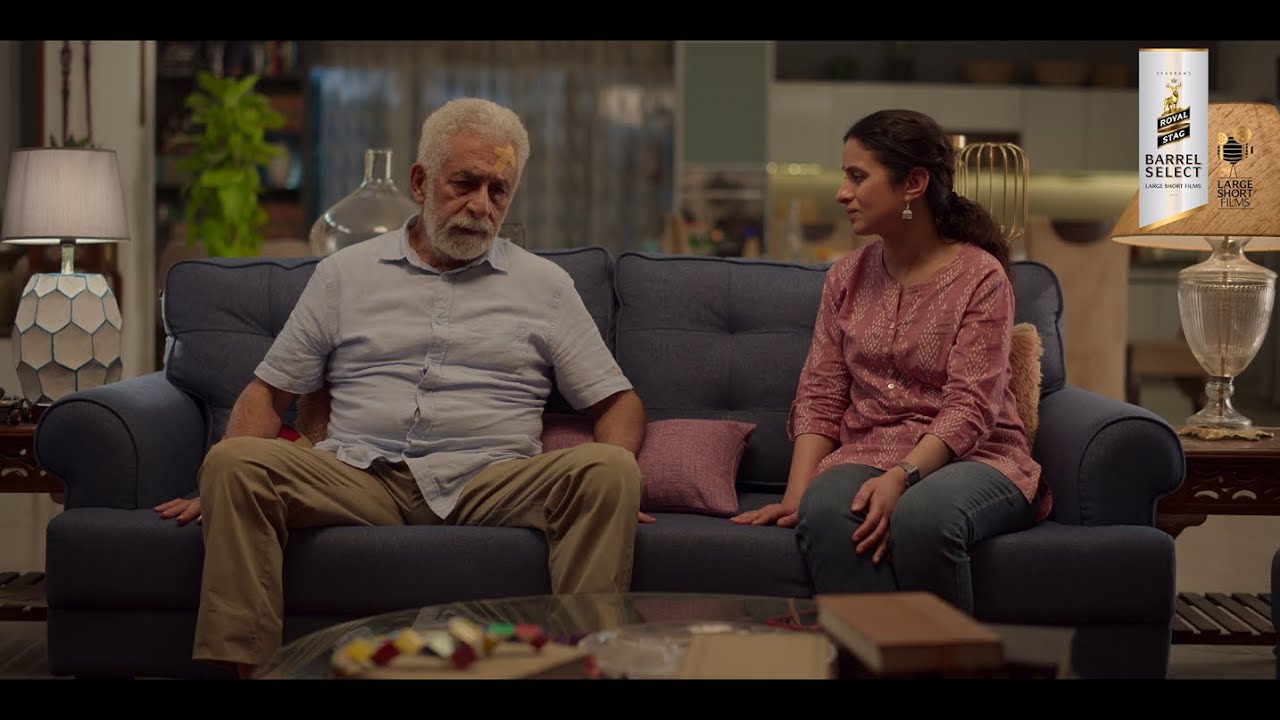By Rahul Desai
There are two ways to look at The Broken Table, a discerning 23-minute short film by Chintan Sarda. One, as the story of an old Alzeihmer’s-afflicted man (Naseeruddin Shah, as Giridhar) who struggles through the day with his young new caregiver (Rasika Dugal, as Deepti). Giridhar still thinks he’s a practicing lawyer; he keeps trying to leave for “office” in his car, only to be stopped by the watchman at the gate. Deepti feels awful for him, but as a budding psychologist, she studies his personality. She finds it heartwarming that he remembers his wife perfectly, but forgets other details about his life. His bearings are shaky at best, demonstrated by the fact that he doesn’t even recognize his own grandson when his family leaves to attend a wedding. That it’s Naseeruddin Shah doing this in his twilight years – building on his affecting stage rendition of Florian Zeller’s The Father – only adds to the character’s language of disorientation.
The second way to look at The Broken Table is as the story of a young caregiver and budding psychologist, who has just been informed by her gynecologist that childbearing is no longer an option. Deepti is upset, of course, but more because of the ramifications she suspects this will have on her marriage. When former divorce lawyer Giridhar – the Alzeihmer’s-afflicted old man she has been hired to care for – mistakes Deepti to be one of his clients, she decides to play along. He starts to take notes about her marital equation. In the process, she finds herself a little; she confides in him that her main fear involves Dhruv, her over-practical husband, leaving her once he discovers her ‘flaw’. She starts to take Giridhar seriously once she realizes that the old man, who routinely forgets where he is, remembers the essence of living and companionship. His soul, unlike his mind, has still not faded. Deepti listens to tales of how he met his wife years ago, and looks at him sadly when he goes searching for her in other bedrooms.
The beauty of The Broken Table is that – through a climax that is both startling and thought-provoking – it challenges our notions about the cinema of memory. When we see an aged person suffering from any form of dementia, we automatically view them as a slow-motion tragedy. We get delicate about their fluid relationship with reality, and naturally assume that they are lonely until proven otherwise. We often stop looking at them as humans, and start seeing them as stories – as futures in search of a past, as victims of their own ruptured time-space continuums. Sarda and co-writer Vikram Gupta use this social perception cleverly – the casting of Naseeruddin Shah is part of the design – and fashion a twist that exposes our skewed reading of not only mental diseases but also the cultural agency of thinking itself. It could’ve done without the sentimentality of a background score, but the performances tide over the moment to reveal its depth.
Rasika Dugal is deceptively good, because she is playing an audience surrogate and a coming-of-age character at once. The film is actually Deepti’s story, her narrative, but the Indian woman is so conditioned to not being a primary character even in her own life that she too treats the film as Giridhar’s story. She isn’t here for herself; she is nowhere for herself. Deepti is so taken by his respect and affection for his wife that she almost wants to believe that the only way a man can love a woman so hard is in retrospect. She strives to believe that only memory makes the heart grow fonder. In doing so, she doesn’t realize that the film opens with her and closes with her. She doesn’t recognize that, all this while, she’s been looking for other films to escape into. She used to wear a nose-ring, but after her husband’s disapproval, she might have decided to ‘fix’ other minds rather than address her own. It takes a man like Giridhar to remember who she was – and who she really is.
Her day-long journey also conveys the theoretical dryness of medicine. Deepti arrives as an aspiring doctor of mental health, but leaves as a student of human nature. Giridhar goes from ‘subject’ to person in her eyes, and all the notes she scribbled in her diary become a lesson in the difference between learning and feeling. Between passion and compassion. Giridhar speaks of a ‘broken table’ from his office that his wife had once turned into art, which is why Deepti is chastened for seeing him as broken art reduced to the functionality of a table. By the end, the film welcomes her into its own cinema of grief. It reclaims a story that was waiting to emerge by letting one single truth unfold: If the erasure of memory is a disease, the erasure of identity is the real tragedy.





